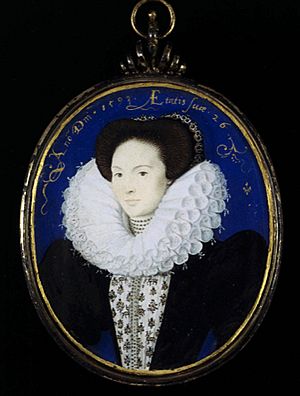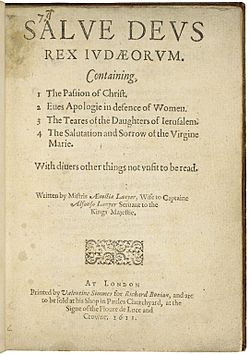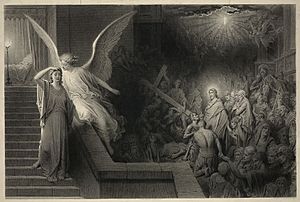Emilia Lanier facts for kids
Quick facts for kids
Emilia Lanier
|
|
|---|---|
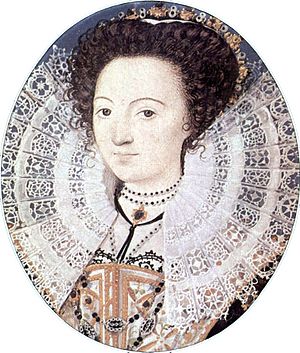
Portrait by Nicholas Hilliard
|
|
| Born |
Aemilia Bassano
1569 Bishopsgate
|
| Died | 1645 (aged about 76) |
| Movement | English Renaissance |
| Parent(s) |
|
Emilia Lanier (born Aemilia Bassano, 1569–1645) was an English poet. She was the first woman in England to become a professional poet. She did this by publishing her book of poems, Salve Deus Rex Judaeorum (which means Hail, God, King of the Jews) in 1611. Some people believe she might have been the "Dark Lady" in Shakespeare's poems.
Contents
Emilia Lanier's Life Story
We know about Emilia Lanier's life from her letters, poems, and official records. These include medical and legal papers. Researchers also found notes about her in the diary of astrologer Dr Simon Forman. He was a medical doctor who used astrology. Emilia visited Forman many times in 1597. His notes show she was a very ambitious woman. She wanted to move up in society and become part of the gentry class.
Her Early Years
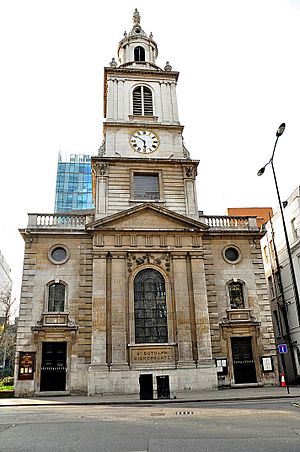
Emilia Bassano was baptized at St Botolph church in Bishopsgate on January 27, 1569. Her father, Baptiste Bassano, was a musician from Venice. He worked for Queen Elizabeth I. Her mother was Margret Johnson.
Emilia's father died when she was seven years old, in 1576. His will said that Emilia should get £100 when she turned 21 or got married. This money was her dowry.
After her father died, Emilia went to live with Susan Bertie, Countess of Kent. Some experts think Emilia was a servant there, while others believe she was fostered. We don't have clear proof. While living with Bertie, Emilia received a good education. She learned Latin and studied subjects usually taught to young men. This experience likely encouraged her to publish her own writings later.
Afterward, Emilia lived with Margaret Clifford, Countess of Cumberland and her daughter, Lady Anne Clifford. Emilia's own poems mention these women. Emilia's mother died when Emilia was 18, in 1587.
Becoming an Adult
Soon after her mother's death, Emilia became the partner of Henry Carey, 1st Baron Hunsdon. He was a powerful courtier and a cousin of Queen Elizabeth I. Lord Hunsdon was much older than Emilia. He gave her £40 a year. Records suggest Emilia enjoyed her time with him.
In 1592, when Emilia was 23, she became pregnant. Lord Hunsdon gave her money. Emilia then married her cousin, Alfonso Lanier. He was also a musician for the Queen. They married on October 18, 1592.
Forman's diary suggests Emilia's marriage was not happy. It says she was happier as Lord Hunsdon's partner. Her husband, Alfonso, spent her money and got into debt. Emilia also told Forman about having several miscarriages. She gave birth to a son, Henry, in 1593. She had a daughter, Odillya, in 1598, but Odillya died when she was ten months old.
In 1611, Emilia published her book of poems, Salve Deus Rex Judaeorum. She was 42 years old. She was the first woman in England to call herself a professional poet. Many people at the time found her poetry very bold. Today, many scholars see her writings as early feminist ideas.
Her Later Years
Alfonso died in 1613. After his death, Emilia supported herself by running a school. She rented a house for her students. However, she had problems with the landlord and was arrested twice between 1617 and 1619. Because of these arrests, parents did not want to send their children to her school. So, Emilia's dream of running a successful school ended.
Emilia's son, Henry, married Joyce Mansfield in 1623. They had two children, Mary (born 1627) and Henry (born 1630). Henry senior died in 1633. Later court papers suggest Emilia may have helped care for her two grandchildren after their father's death.
We don't know much about Emilia's life between 1619 and 1635. Court documents show she sued her husband's brother, Clement. She wanted money he owed her from her late husband's business deals. The court agreed with Emilia. Clement was ordered to pay her £20. He could not pay right away, so Emilia took him to court again in 1636 and 1638. We don't know if she was ever paid in full. However, when she died, she was described as someone who had a steady income or pension.
Emilia Lanier died at age 76. She was buried on April 3, 1645.
Emilia Lanier's Poetry
In 1611, at 42, Emilia Lanier published her poetry collection, Salve Deus Rex Judaeorum. It was very unusual for an Englishwoman to publish a book, especially to earn a living. Emilia was only the fourth woman in the British Isles to publish poetry. Her book was the first book of important, original poems written by an Englishwoman. She hoped to find someone rich to support her writing.
Her book is also seen as the first possibly feminist work published in England. All the poems are dedicated to women. The main poem, "Salve Deus Rex Judaeorum," is about the crucifixion of Christ. It is told from a woman's point of view. Her poems praise women's good qualities and Christian faith. They also show a wish for a perfect world where everyone is equal.
What Influenced Her Poems
Emilia Lanier was influenced by many writers she read. These included Edmund Spenser, Ovid, Petrarch, Chaucer, and Christine de Pizan. She also used ideas from unpublished writings by Mary Sidney, Countess of Pembroke. Lanier also knew about plays by John Lyly and Samuel Daniel.
Her Main Poems
The main poem, "Salve Deus Rex Judaeorum," has ten shorter poems before it. These are dedicated to important women, starting with the Queen. There is also a message to the reader. It defends "good women" against those who criticize them.
The main poem is a long story with over 200 stanzas. It tells the story of Christ's suffering and death. It is told almost entirely from the point of view of the women around him. The title means "Hail, God, King of the Jews," which were words used to mock Jesus on the Cross.
Some modern scholars see Lanier's poem as a different way of looking at the Crucifixion. Her ideas have been called "independent of church tradition." Other scholars believe Lanier's faith was real and sincere.
In Salve Deus, Lanier also talks about Pilate's wife. She is a small character in the Bible who tries to stop Christ's unfair trial and crucifixion. Lanier also points out that the male apostles left Christ during his crucifixion. Lanier's poem also includes negative views towards Jewish people, which were common at that time.
Experts do not fully agree on the religious meaning of the main poem. Some say it is a truly religious poem from a strong female viewpoint. Others see it as clever satire. But most scholars agree that Salve Deus Rex Judaeorum has strong feminist ideas.
Lanier's book ends with the "Description of Cookham." This poem remembers Margaret Clifford, Countess of Cumberland and her daughter Lady Anne Clifford. It is the first published country-house poem in English. Lanier was inspired by her time at Cookham Dean. She lived there with Margaret Clifford and her daughter, Anne. Lanier was their tutor and companion.
Feminist Ideas in Her Work
Many people see Salve Deus Rex Judaeorum as one of the first feminist works in English literature. Scholar Barbara Kiefer Lewalski calls Lanier the "defender of womankind." Lewalski believes Lanier starts her ideas about women's importance in the first few poems. These poems are dedicated to important women. This shows the idea that "goodness and learning pass from mothers to daughters."
Another scholar, Marie H. Loughlin, adds to this idea. She says that women's importance began with Eve. Loughlin argues that Lanier believes women need to understand both the spiritual and real worlds. Lanier seems to argue that women should focus on their importance in the real world. This helps them connect with their spiritual life. Her argument comes from her wish to raise women to the same level as men.
The "Dark Lady" Theory
Some people have suggested that Emilia Lanier was Shakespeare's "Dark Lady". This idea was first suggested by A. L. Rowse. It has been repeated by other writers since then.
We don't know Emilia's hair color. However, some of her Bassano cousins were called "black." This was a common term at the time for people with dark hair or Mediterranean looks. Emilia came from a family of court musicians. This fits Shakespeare's description of a woman playing the virginal in his Sonnet 128. Shakespeare also says the woman was "forsworn" to another in Sonnet 152. Some think this refers to Emilia's relationship with Lord Hunsdon, who was Shakespeare's patron.
However, other scholars who study Lanier, like Susanne Woods, doubt this theory. Barbara Lewalski notes that Rowse's theory has made people focus less on Lanier as a poet herself. Still, Martin Green argued that even if Rowse's main argument was wrong, he was right that Lanier is mentioned in the Sonnets.
Playwrights and musicians have also shared their views. The playwright Andrew B. Harris wrote a play called The Lady Revealed. It tells the story of Rowse's idea that Lanier was the "Dark Lady." In 2005, Peter Bassano, a relative of Emilia's brother, suggested she wrote some texts for William Byrd's 1589 Songs of Sundrie Natures. He also thought one of these songs might have inspired Shakespeare's Sonnet 130. The Irish poet Niall McDevitt also believes Lanier was the Dark Lady. He thinks she turned down Shakespeare's advances.
In Shakespeare's Plays
Some experts believe Emilia Lanier might be hinted at in Shakespeare's plays. For example, the names Emilia in Othello and Bassanio in The Merchant of Venice are similar to her name and family name.
One idea is that the character Emilia in Othello speaks some of the first feminist lines on an English stage. This could be a way for Shakespeare to refer to Emilia Lanier herself. Also, the musicians in both plays, some argue, could represent members of her family.
In November 2020, Peter Bassano, a relative of Lanier's uncle, published a book called Shakespeare and Emilia. He claims to have found proof that Lanier is the Dark Lady.
Her Legacy
Emilia Lanier was part of the minor gentry because her Italian father was a royal musician. She received more education in the home of Susan Bertie, Countess of Kent. After her parents died, Lanier was the partner of Henry Carey, 1st Baron Hunsdon, who was a cousin of Elizabeth I of England. In 1592, she became pregnant. She then married Alfonso Lanier, her cousin, who was a court musician. She had two children, but only one lived to adulthood.
Emilia Lanier was mostly forgotten for hundreds of years. But in recent decades, many people have started studying her work. She is remembered for her book of poems, Salve Deus Rex Judaeorum. Because of this book, she is seen as the first professional female poet in the English language. She is also known as one of England's first feminist writers. Some also believe she might be the mysterious "dark lady" from Shakespeare's poems.
See also
 In Spanish: Emilia Bassano para niños
In Spanish: Emilia Bassano para niños
 | William M. Jackson |
 | Juan E. Gilbert |
 | Neil deGrasse Tyson |


